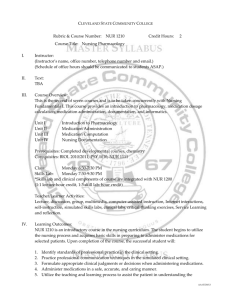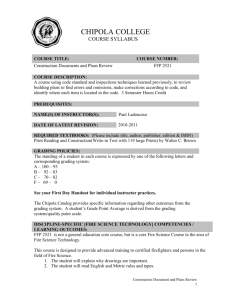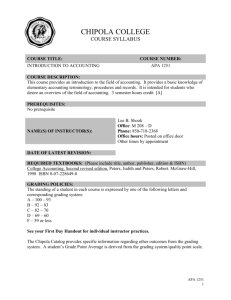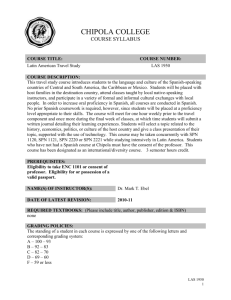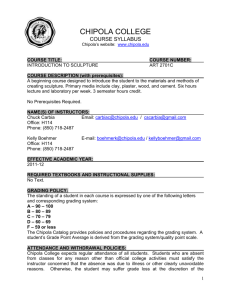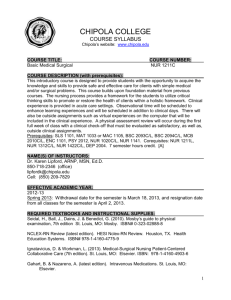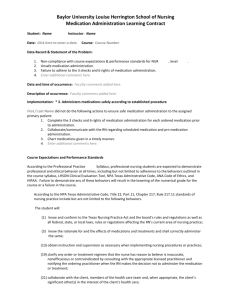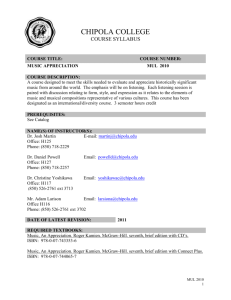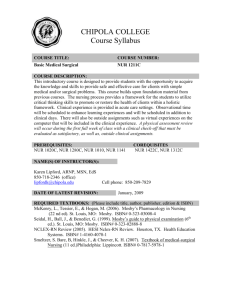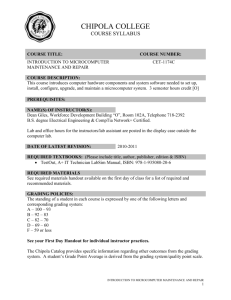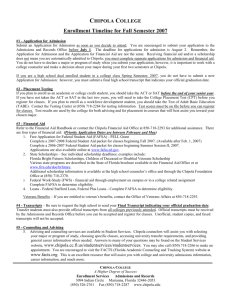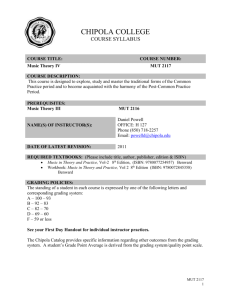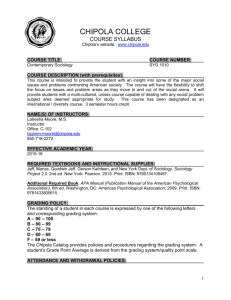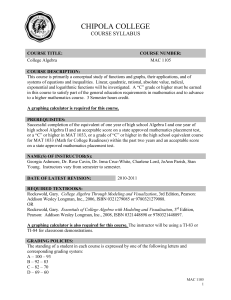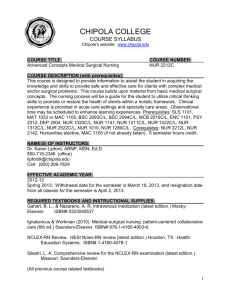NUR 2142 - Pharmacology II
advertisement
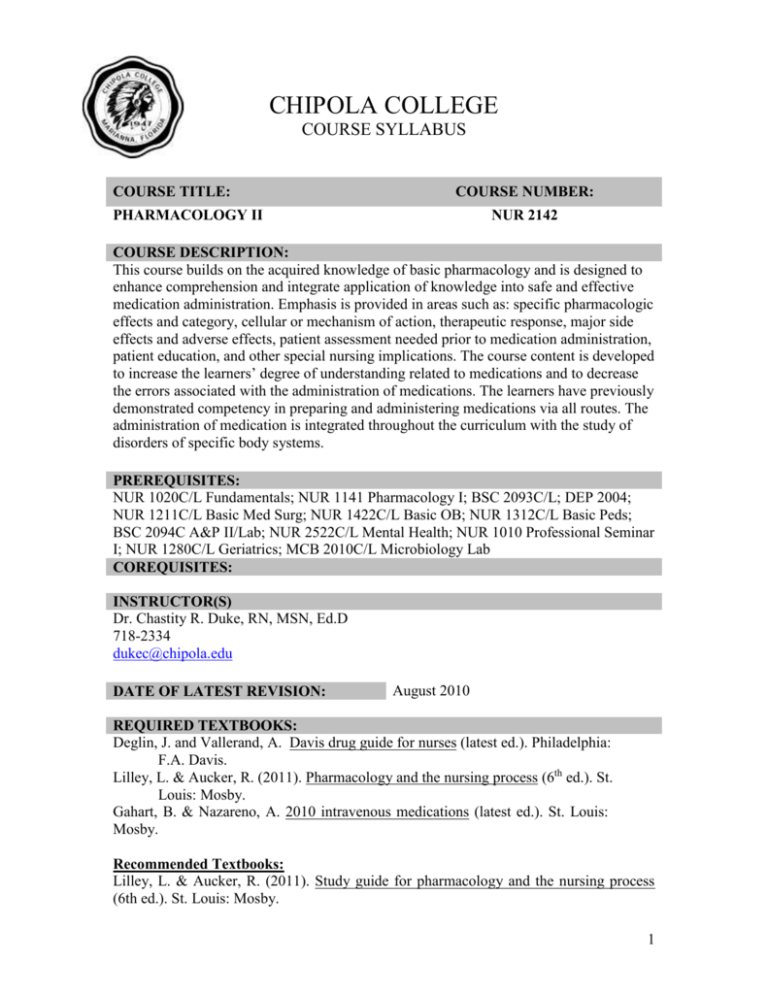
CHIPOLA COLLEGE COURSE SYLLABUS COURSE TITLE: COURSE NUMBER: PHARMACOLOGY II NUR 2142 COURSE DESCRIPTION: This course builds on the acquired knowledge of basic pharmacology and is designed to enhance comprehension and integrate application of knowledge into safe and effective medication administration. Emphasis is provided in areas such as: specific pharmacologic effects and category, cellular or mechanism of action, therapeutic response, major side effects and adverse effects, patient assessment needed prior to medication administration, patient education, and other special nursing implications. The course content is developed to increase the learners’ degree of understanding related to medications and to decrease the errors associated with the administration of medications. The learners have previously demonstrated competency in preparing and administering medications via all routes. The administration of medication is integrated throughout the curriculum with the study of disorders of specific body systems. PREREQUISITES: NUR 1020C/L Fundamentals; NUR 1141 Pharmacology I; BSC 2093C/L; DEP 2004; NUR 1211C/L Basic Med Surg; NUR 1422C/L Basic OB; NUR 1312C/L Basic Peds; BSC 2094C A&P II/Lab; NUR 2522C/L Mental Health; NUR 1010 Professional Seminar I; NUR 1280C/L Geriatrics; MCB 2010C/L Microbiology Lab COREQUISITES: INSTRUCTOR(S) Dr. Chastity R. Duke, RN, MSN, Ed.D 718-2334 dukec@chipola.edu DATE OF LATEST REVISION: August 2010 REQUIRED TEXTBOOKS: Deglin, J. and Vallerand, A. Davis drug guide for nurses (latest ed.). Philadelphia: F.A. Davis. Lilley, L. & Aucker, R. (2011). Pharmacology and the nursing process (6th ed.). St. Louis: Mosby. Gahart, B. & Nazareno, A. 2010 intravenous medications (latest ed.). St. Louis: Mosby. Recommended Textbooks: Lilley, L. & Aucker, R. (2011). Study guide for pharmacology and the nursing process (6th ed.). St. Louis: Mosby. 1 GRADING POLICIES: The standing of a student in each course is expressed by one of the following letters and corresponding grading system: A – 100 – 93 B – 92 – 83 C – 82 – 75 PLEASE NOTE THAT AN UN-ROUNDED GRADE OF 75% OR ABOVE WILL BE REQUIRED TO CONTINUE PROGRESSION IN THE NURSING PROGRAM. Students must have an un-rounded unit exam average of 75% or above before they will be allowed to take the final exam. Quiz grades are added after a 75% average has been achieved on unit exams and the final. The last day to withdraw from a class for Fall term is November 3rd. The last day to resign from all classes for Fall term is November 17. The Chipola Catalog provides specific information regarding other outcomes from the grading system. A student’s Grade Point Average is derived from the grading system/quality point scale. DISCIPLINE-SPECIFIC (HEALTH SCIENCES) COMPETENCIES / LEARNING OUTCOMES: N1. Utilize the nursing process to plan, to implement, and to evaluate safe nursing care to promote the health of individuals and families with nursing problems. N2. Demonstrate competence in nursing skills, including the cognitive, psychomotor, and effective domain. N3. Recognize, intervene as necessary or alert appropriate persons to changes in a patient’s condition which changes the level of care N4. Apply principles of bio-physical, environmental, psychological, and socio-cultural sciences while providing comprehensive nursing care. N5. Use communication effectively with clients, families, significant others, and health team members. N6. Modify his/her own behavior for enhancements of relationships with others N7. Enable individuals and families to access available social and health resources within the community to meet identified healthcare needs. N8. Adhere to legal and ethical principles of nursing practice. These principles include: assuming responsibility for personal and educational growth, using sound judgment to make decisions related to clinical performance, and seeking help when necessary. 2 N9. Participate as a member of various nursing organizations. N10. Protect the privacy and rights of clients by acting as a client advocate. N11. Meet all requirements to take the National Council Licensure Examination (NCLEX). STUDENT LEARNING OUTCOMES/OBJECTIVES FOR NUR 2142C: See chart, last page. MEANS OF ACCOMPLISHING OUTCOMES: Lecture, discussions, projects, selected readings, handouts, audio-visuals, skills lab, return demonstration, clinical lab, and/or computer lab. LIBRARY AND ON-LINE REFERENCE MATERIALS: The library is a comprehensive, learning resource center providing information in print, electronic, and multimedia format to support the educational objectives of the College. In addition to print media, online catalogs and resources can be accessed through www.linccweb.org and www.netlibrary.com. Library hours are posted each semester at the building entrance. Chipola’s website is located at www.chipola.edu. See your First Day Handout for individual instructor recommendations and resources. TECHNOLOGY RESOURCES: The Information Technology Center, located in the library, is equipped with computer workstations. Lab hours are posted each semester at the building entrance. Required Video List: Administering Medications Administering Non-parenteral Medications Administering Injectable Medications Preventing Adverse Drug reactions Initiating IV Therapy Administering IV Medications Volumetric Infusion Pump ASSIGNMENT SCHEDULE: Topical Outline: I. The Nursing Process II. Areas of Medication Discussion III. Teaching about Medication and Abuse 3 ATTENDANCE AND WITHDRAWAL POLICIES: Chipola College expects regular attendance of all students. Students who are absent from classes for any reason other than official college activities must satisfy the instructor concerned that the absence was due to illness or other clearly unavoidable reasons. Otherwise, the student may suffer grade loss at the discretion of the instructor. Chipola policy allows each instructor to specify in the course handout the attendance policy. It also allows the instructor to decide whether or not an absence is excusable and what effect the absence or tardy may have on the grade. A student is allowed to repeat a course a maximum of three (3) times. On the third attempt a student (1) must bear the full cost of instruction, (2) cannot withdraw, and (3) must receive a grade. See your First Day Handout for individual instructor or department-specific attendance and withdrawal policy. MAKE-UP POLICY: Chipola allows each instructor to specify in the instructor handout the makeup policy. Please see your first day handout for individual instructor policy. ACADEMIC HONOR CODE POLICY: Students are expected to uphold the Academic Honor Code. Chipola College’s Honor Code is based on the premise that each student has the responsibility to 1) uphold the highest standards of academic honesty in his/her own work; 2) refuse to tolerate academic dishonesty in the college community; and 3) foster a high sense of honor and social responsibility on the part of students. Further information regarding the Academic Honor Code may be found in the Chipola Catalog, Student Governance section. STUDENTS WITH DISABILITIES POLICY: Chipola College is committed to making all programs and facilities accessible to anyone with a disability. Chipola’s goal is for students to obtain maximum benefit from their educational experience and to effectively transition into the college environment. Students with disabilities are requested to voluntarily contact the Office of Students with Disabilities to complete the intake process and determine their eligibility for reasonable accommodations. 4 LINKING COURSE, DISCIPLINE, AND GENERAL EDUCATION COMPETENCIES COLLEGE-LEVEL STUDENT LEARNING OUTCOMES FOR NUR & DISCIPLINEAssessment 2142C SPECIFIC Method Used GENERAL EDUCATION By Faculty The student will: COMPETENCIES* 1. Knowledge of pharmacology; drug name, N1, N2, NS5, T, UT, OT, CF, classifications, and actions; adverse effects; drug M2, M4,C4, Q, SP, SD, dose calculations for infusion rates, titration, and C6, T6 Clin., Obs, Sk compatibilities. Check Offs 2. Knowledge of safe preparation and N2, N3, N4, T, UT, OT, CF, administration of medications. C4, C6, T6 Q, SP, SD, Clin., Obs, Sk Check Offs 3. Knowledge to develop teaching plans to meet N1, N4, N5, T, UT, OT, CF, client needs specific to medication SS11 Q, SP, SD, administration. Clin., Obs, Sk Check Offs 4. Knowledge of resources when encountering N2, N4, N8, T, UT, OT, CF, question of medications or dosing parameters. T2, T3, T6 Q, SP, SD, Clin., Obs, Sk Check Offs 5. Ability to use equipment correctly and N1, N2, N8, T, UT, OT, CF, implement techniques for safe and effective M4, T2, T3, Q, SP, SD, preparation and administration of medication. T6 Clin., Obs, Sk Check Offs For a list of Chipola’s College-Level Competencies, see www.chipola.edu. 5
